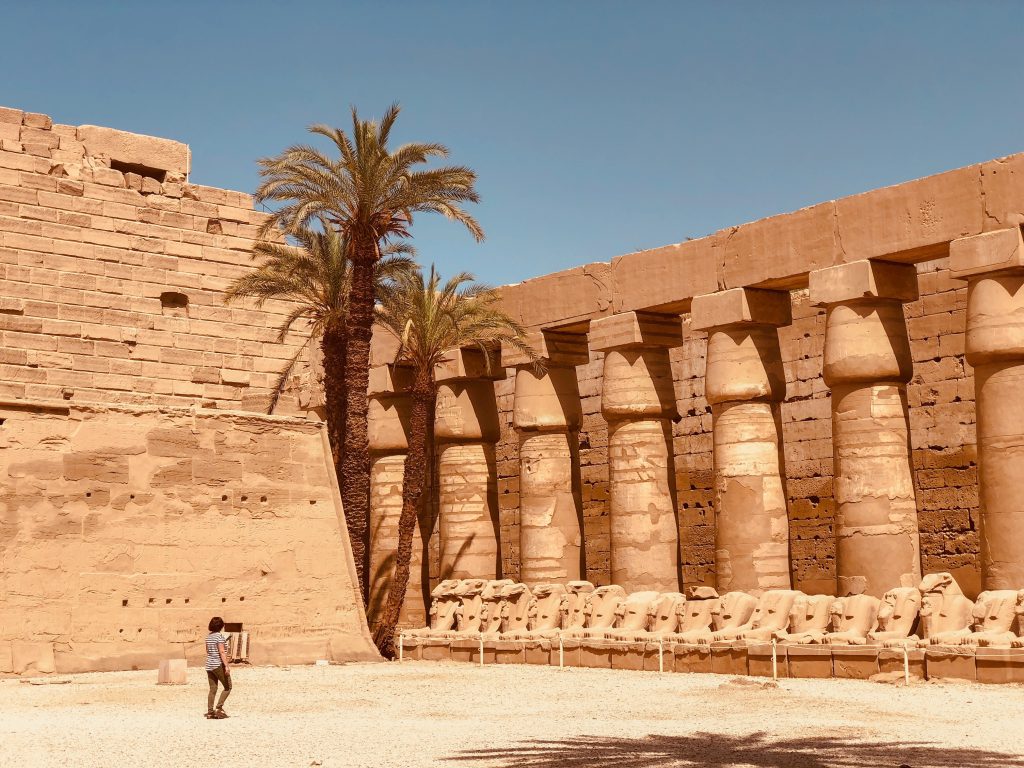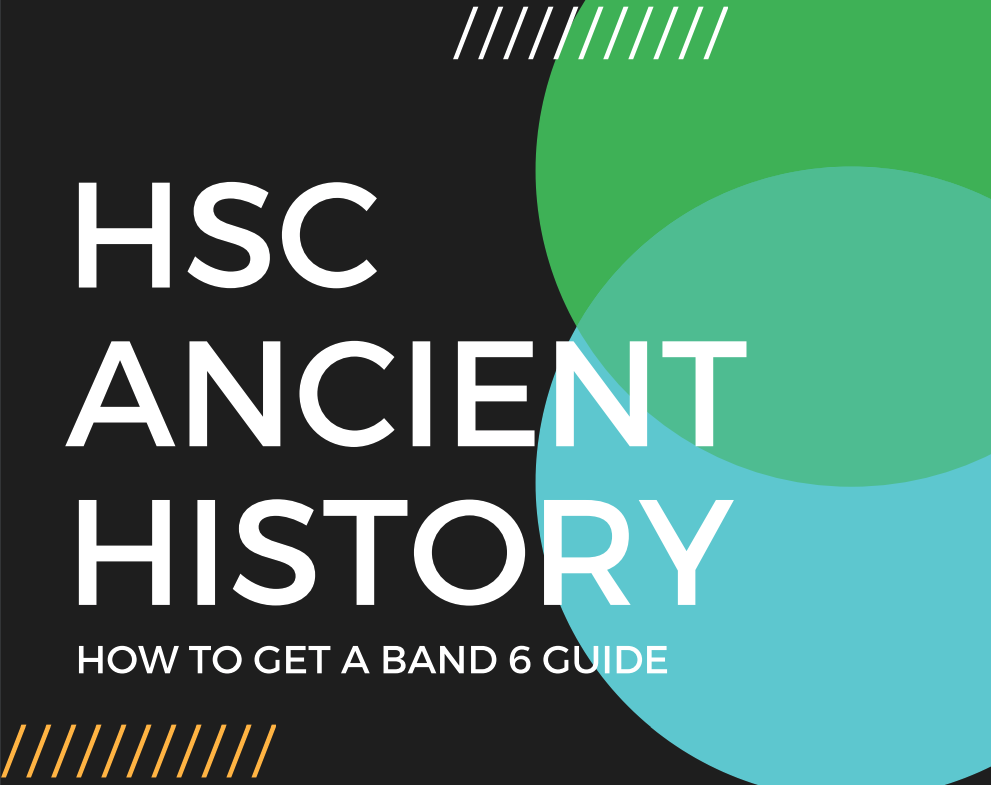
Dreaming of a Band 6 in HSC Ancient History but have no idea how to achieve it?
Well, you’re in the right place as we’ve got you covered with a compilation of all the essential tips and tricks to ace HSC Ancient History! Whether you’re looking to develop your history skills, seek prep advice or refine your study techniques, we’re here to help.
So, what are you waiting for? It’s time to delve in and discover your potential!
Part 1: Developing Essential HSC Ancient History Skills
Part 2: Reviewing the Content
Part 3: Choosing Your Study Techniques
Part 4: Preparing for Your Exam
Part 1: Developing Essential HSC Ancient History Skills
Much like English, effectively analysing sources and writing informative essays are critical skills to achieving success.
The final exam will directly assess these skills and your ability to provide accurate historical information. So, it’s important that you are well-equipped with incorporating your given sources and own knowledge into your written responses!
How to Ace Your Source Analysis
Sources are an essential component of HSC Ancient History that provide evidence of important historical details. Analysing and embedding sources in your response is not a skill you can slack on, but it’s not as daunting as you think!
There are several questions that you can ask to ensure that you’re accurately and effectively assessing your sources:

- Is it a primary or secondary source?
- Who made the source? Who was the intended audience? What was the purpose of the author? Look out for any bias that the author may have had.
- When was the source made? How does this reflect the historical events happening at the time?
- Where was the source made? What meaning does the location of the source have? What type of material is the source made from?
- What information does the source reveal? Does the source give a complete picture, or is it unreliable? Does this source corroborate with other sources?
Once you’ve gone through all these questions, you should be able to make a strong assessment of the validity and relevancy of the historical sources.
How to Write a Band 6 HSC Ancient History Essay
Now that you have your source analysis down pat, it’s time to move on to communicating your analysis in an essay format! Ancient History markers look for detailed, structured, and informed responses that use a range of relevant historical terms and concepts.
Before jumping straight into writing, it’s helpful to create a rough draft to help you structure your ideas and draw out the keywords of the question.
Remember, you need to identify what the question is asking to answer it correctly. Whether the question asks you to analyse, evaluate, or assess, make sure that you link your response to the syllabus dot points!
It’s important to have a strong thesis that addresses these points and grabs the attention of your marker!
Form a killer Ancient History essay plan with our tips here!
Once you’ve structured your ideas, start writing a response that integrates and analyses your historical evidence.
There are few marks awarded to students who simply list a historical source without explaining what the evidence reveals. In mentioning your sources, it’s mandatory to identify source references if you’re looking to achieve a Band 6.
Compare the differences between a Band 6 and a Band 5 response here!
Part 2: Reviewing the Content
It’s a no-brainer that understanding the content is essential to acing your exams and assessments! To give you a refresh, HSC Ancient History comprises of four sections:
- Cities of Vesuvius – Pompeii and Herculaneum
- Ancient Societies
- Personalities in their Times
- Historical Periods

Core Study: Cities of Vesuvius – Pompeii and Herculaneum
What exactly does this Core Study involve? Let’s check out the syllabus.

The core study is a Roman study that will make up 30 hours of your class time, where you will “investigate the range and nature of archaeological and written sources for the study of the cities of Pompeii and Herculaneum”.
Those 30 hours will consist of a ‘Survey’ (3 hours) and a ‘Focus of Study’ (27 hours).
Survey: The geographical setting and natural features, the impact of the eruption of AD 79, early discoveries and the changing nature of excavations, and representations of Pompeii and Herculaneum over time.
Focus of Study: Investigating and interpreting the sources for Pompeii and Herculaneum and reconstructing and conserving the past.
By the end of the Core Study, you should be able to account “for the nature of continuity and change in the ancient world” by analysing and evaluating the “different interpretations and representations of the past”.
Ancient Societies
Unlike the Core Study, the historical subject area of this topic varies across schools, ranging from Persian Society to Spartan Society.
You will be investigating a range of archaeological and written sourced and historiographical issues. In an exam, you will typically have to answer three questions worth 25 marks in total.
The mixture of questions usually look like this:
- Lower-range questions (1-5 marks)
- Mid-range questions (6-9 marks)
- High-value questions (10-15 marks)
Different questions require a different amount of detail, and you should set your time according to how many marks it is worth!
Our holistic approach will help you gain confidence in Ancient History content knowledge & exam technique so you stress less when it comes time for your HSC exam!
Part 3: Choosing Your Study Techniques
After you’ve developed a better understanding of the HSC Ancient History content, the next step is studying for your exams and assessments. But how do you know where to start?
Don’t worry if you’re feeling lost, so are many others! The top tip to remember is that there are a variety of techniques that you can choose from that are personalised to your learning approach.
Let’s break some of these techniques!
How to Write Effective Study Notes
There’s no easy way to break it — HSC Ancient History is a very content-heavy subject, and taking notes can be a very time-consuming process.
To help you navigate through the information overload, the first step is to familiarise yourself with the syllabus. Structuring your notes based on the HSC Ancient History syllabus is an effective way to ensure that you are focusing solely on assessable content!
Once you’ve structured your notes around the syllabus, you will need to continue breaking down your content by dividing your notes into headings and subheadings for ease of studying. Instead of writing a huge chunk of text, write your notes in simple dot points (with extra detail where necessary) to help memorise.
Here is a simple example of what breaking down a syllabus point might look like:
Government: ephorate, gerousia, ekklesia
- Ephorate
- Description
- Roles and powers
- Gerousia
- Description
- Roles and powers
- Ekklesia
- Description
- Roles and powers
Alongside your textbook notes, it’s vital that you incorporate a mixture of written and archaeological sources into your notes. As we’ve mentioned above, using sources in your essay is essential for any Band 6 response, and including a brief analysis in your notes will be super helpful for when exam time arrives.
Discover more about writing effective HSC Ancient History study notes here!
How to Memorise Content for Ancient History
Once you’ve structured your notes according to the syllabus dot points and included all the relevant sources, it’s time to start memorising your notes!
Before you begin, it’s helpful to figure out what style of learning suits you best. If you’re wondering why that’s important, the answer is because identifying your learning style is known to help improve the efficiency of your memory absorption.
The three categories of learning are:
- Audio: Learning by hearing and speaking
- Visual: Learning by seeing and reading
- Kinaesthetic: Learning by touching and doing
You might find that a combination of these styles works best for you!
After you’ve identified your learning style, you can start writing out your notes and begin memorising them through your style of choice.
If you’re an audio learner, reading your notes aloud and recording them to listen to later can be super helpful in helping you to retain your information. If you’re a visual learner, go wild with adding images, timelines, and mind maps to your notes.
And sneaky hint, if you’re both an auditory and visual learner, flashcards are a perfect compromise. When it comes to kinaesthetic learners, it can be helpful to associate movements with your notes and act out any dramatic events (Ancient Societies are known for their theatrics!).
Most importantly, revise revise revise!
Get your memorisation skills up to scratch with more of our tips here!
Part 4: Preparing for your Exam
Now that you’ve perfected your study techniques, it’s time to put your knowledge to the test by answering some practice questions and past papers in preparation for exam day.
HSC Ancient History Past Papers
Practising with past papers is the best way to get the most out of your studies. Not only does it give you an idea of the exam structure and the marking division, but it also provides you with an opportunity to test your time management.
Ideally, you should practise under exam conditions to provide you with the best indication of allocating your time for different questions. After you’ve completed the paper, you should mark your responses against the Marking Criteria.
Wherever you see room for improvement is an opportunity for further revision!
Check out our master list of HSC Ancient History Past Papers here!
Practice Questions
Aside from past papers, finding practice questions or creating your own ones are a useful way to get more exposure to answering exam-style questions!
Here are some practice questions we’ve created that you can use to study:
- HSC Ancient History Personality Study Practice Questions
- HSC Ancient History Pompeii and Herculaneum Practice Questions
- 20+ HSC Ancient History Practice Questions for Ancient Societies
And that wraps up our guide to achieving a Band 6 in HSC Ancient History! You’ve got this!
Now if you’re looking for other Band 6 guides to help you ace your other subjects, we’ve got some you can check out below:
- HSC Economics
- HSC Business Studies
- HSC Advanced English
- HSC Standard English
- HSC Visual Arts
- HSC Modern History
- HSC Biology
- HSC Chemistry
- HSC Physics
- HSC Maths
Are you looking for some extra help with HSC Ancient History?
We have an incredible team of HSC tutors and mentors!
We can help you master the HSC Ancient History syllabus and ace your upcoming assessments with personalised lessons conducted one-on-one in your home or online, or at one of our state of the art campuses in Hornsby or the Hills!
We’ve supported over 8,000 students over the last 11 years, and on average our students score mark improvements of over 20%!
To find out more and get started with an inspirational HSC tutor and mentor, get in touch today or give us a ring on 1300 267 888!
Ashley Sullivan is a Content Writer for Art of Smart Education and is currently undertaking a double degree in Communications (Journalism) and a Bachelor of Laws at UTS. Ashley’s articles have been published in The Comma and Central News. She is a film, fashion and fiction enthusiast who enjoys learning about philosophy, psychology and unsolved mysteries in her spare time.



